BUILDING MUSCLE … WITHOUT MEAT?
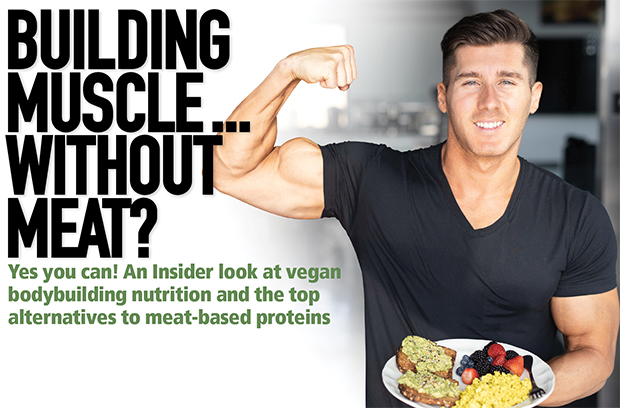
BUILDING MUSCLE … WITHOUT MEAT?
Yes you can! An Insider look at vegan bodybuilding nutrition and the top alternatives to meat-based proteins
A plant-based diet and vegan lifestyle is becoming more and more popular nowadays, especially in Canada and even with top-caliber athletes. Why is this? Well, I believe that people are becoming more educated on the health benefits and positive effects on the environment that a plant-based diet delivers over one that includes animal products. It’s a positive sign; I mean, people actually care more about their health and the impacts they’re having on the environment than they ever have before, myself included! I’m not one to judge, and have absolutely nothing against people that eat a lot of animal products and meat. In fact, most of my friends and family all eat a ton of meat! But for ethical, environmental, and health reasons, I’ve chosen to adopt primarily a plant-based diet. Even if you still include animal products in your diet, and even if they’re a large percentage of your diet, everyone can still benefit from plant-based foods, and more specifically, plant-based proteins. Whether you’re a dedicated meat-eater or hardcore vegan, read on to learn more about the benefits of plant-based nutrition and how you can incorporate into your fitness plan to help you reach your goals, no matter what they are!
Why Go Meatless?
Whenever I tell people that I’m transitioning over to a plant-based diet, the first thing they ask me is why. Well, there are two or three main reasons why I, along with many others, am adopting a vegan lifestyle. Here’s the rundown.
Environmental Impact
One of the primary reasons people become vegetarian or vegan is because of the positive impact it can, and will, have on the environment and the world we live in. A 2010 United Nations (UN) report emphasized that a global shift towards plant-based nutrition is critical to help reverse the negative impacts of climate change and reduce world hunger. The UN report goes on to explain that as the global population continues to rapidly increase, western diets high in meat and dairy products are simply unsustainable. Here are a few more alarming statistics. The livestock industry arguably has the greatest negative impact on the environment and world.
It has a major impact on climate change and is responsible for 18 to 20 percent of the world’s greenhouse gas emissions. The livestock industry is also responsible for over 60 percent of anthropogenic ammonia emissions, which cause acid rain and acidification of ecosystems. The growth of the livestock industry also negatively impacts the world’s fresh water supply, is a major source of pollution, causes land degradation, and reduces biodiversity.
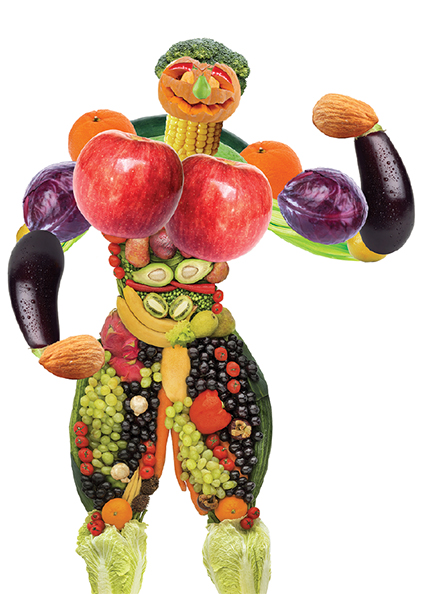
Let’s Talk Ethics
Another reason some people decide to stay away from animal products is because of the way some animals are raised and treated. In fact, many animals are forced to live in unsanitary, overcrowded conditions and are slaughtered in very inhumane ways. Okay, enough of my environmental and ethical rant—let’s move on to the positive health effects that a plant-based diet can provide!
Exploring the Health Benefits
Mountains of research show that plant-based diets are optimal for human health. They can help reduce blood pressure and cholesterol levels and regulate blood sugar. Plant-based diets are effective at treating chronic diseases, such as arthritis, cancer, diabetes, chronic obstructive pulmonary disease (COPD), and cardiovascular disease.
Several studies show a clear link between a plant-based diet and a reduction in cancer risk. On the other hand, a diet high in meat is linked to an increase cancer risk. The same goes for heart disease and especially for men. Cardiovascular disease is one of man’s worst enemies, but it can be avoided. Studies show that a reduction in consumption of animal products can dramatically reduce the risk of cardio disease. Plant-based diets contain a ton of health-promoting nutrients, but very little saturated fat and cholesterol, which are heart health killers.
Is It Possible to Build Muscle Without Meat?
Of course it’s entirely possible to build muscle without meat. Let’s take a look at how one goes about building muscle. We work out, train hard with resistance, and break down muscle fibres, which then repair and grow bigger with the help of nutrients such as proteins, fats, and carbs. The amino acids found in protein, specifically leucine and the other two branched-chain amino acids (BCAAs), isoleucine and valine, have the greatest impact on muscle growth and recovery. Animal-based products contain high amounts of BCAAs and the other essential amino acids, which is why many people consume protein from animal sources. However, a good variety of plant-based proteins can also deliver the body with high amounts of BCAAs and essential amino acids and deliver the exact same muscle-building effects as animal-based proteins!
What Are the Benefits of Vegan Protein Over Animal Protein?
As I already explained, there are many health benefits to a plant-based diet over one that includes lots of animal products. These same benefits apply to plant-based proteins over animal proteins. In addition, many people have food sensitivities or allergies to various animal-based protein sources, for instance, dairy. A large percentage of the population has an allergy or sensitivity to dairy products, and this includes things such as whey protein and casein. Other people have a hard time digesting and utilizing the protein from meats, especially red meat. Most plant-based protein sources are hypoallergenic (meaning the majority of the population has absolutely no allergy to them) and are very easy for the body to digest and use. This is actually another reason why almost all of my protein sources are plant-based—my body can simply digest and use them much more efficiently.
What Are Some of the Top Vegan Protein Food Sources?
Plant-based proteins are gaining more and more popularity in recent years, and for good reason! Vegan proteins provide muscle-building and recovery benefits that are comparable to animal-based proteins. Plant proteins also deliver additional health benefits and nutrients that animal proteins can’t provide. In this feature, I’m going to give you the details on the top plant-based protein sources and their unique properties.

Sacha Inchi
The sacha inchi plant is native to the Peruvian rain forest and has traditionally been used for centuries as an energizing food source. It also goes by the name of mountain peanut, but it’s not related to the traditional peanut at all. Sacha inchi protein is low allergenic and delivers a high content of aminos, including all nine essential amino acids, making it a complete protein source. It’s particularly high in tryptophan, which makes it a perfect complement to hemp and pea protein, which tend to have a lower tryptophan content. Sacha inchi is one of the greatest plant-based sources of omega-3 fatty acids in the world.
 Yellow Pea
Yellow Pea
Yellow pea protein is derived from yellow split peas and offers up an easily digestible source of natural vegan protein. It delivers an impressive amino acid profile that includes all the essential amino acids. Yellow pea protein is high in BCAAs, lysine, arginine, and glutamine, all of which are important for muscle growth and recovery. Yellow pea is a great source of iron, which can sometimes be hard to find in a plant-based diet. Iron is an important mineral for athletes as it’s involved in oxygen transport, cell growth, and thyroid function. Just like hemp protein, yellow pea protein is hypoallergenic and a great choice for those who have an allergy or sensitivity to milk-based protein powders.
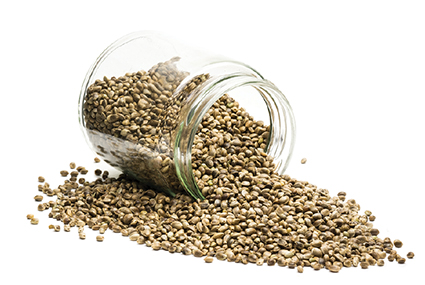
Hemp
Hemp protein is derived from hemp seeds and is considered the king of all plant-based protein sources. Hemp protein powder is produced when whole hemp seeds are cold pressed to expel the oil and then milled at low temperatures to produce a concentrated form of protein. Hemp protein is an excellent source of complete protein and provides a high level of essential amino acids. It’s exceptionally high in branched-chain amino acids (BCAAs). Hemp contains edestin and albumen proteins, which are similar in structure to the proteins that naturally occur in our bodies. Because much of hemp’s protein resembles that found in the human body, it’s very easily digested and used by the body. Hemp protein provides fibre and essential fatty acids (EFAs) and is a good source of many vitamins and minerals. Hemp protein is one of the least allergenic of all protein sources, which makes it an excellent choice for those who are allergic to other protein sources.
 Brown RIce
Brown RIce
Brown rice protein delivers a very high protein content and an excellent amino acid profile. It contains all the essential amino acids and is particularly high in cysteine and methionine. Just like the other vegan protein sources we’ve already covered, brown rice is also a very low allergenic protein. Brown rice protein provides several health benefits and is rich in minerals such as iron and magnesium, vitamins, and natural fibres. The only downside to brown rice protein is that it’s very challenging to find a raw material source that doesn’t have high levels of heavy (toxic) metals, such as lead, cadmium, arsenic, and mercury, which is the only reason I tend to stay away from this protein source.
Soy
Soy is a great source of protein for vegans because it’s considered one of the most complete protein sources, which means it provides all the essential amino acids needed for optimal human health. As a matter of fact, soy protein intake is correlated with healthier cholesterol levels and a reduced risk of heart disease. Soy protein is especially popular with women because research shows that regular consumption can increase bone mineral density and improve the rate of bone turnover in peri- and post-menopausal women. Soy is also an excellent source of calcium, iron, potassium, omega-3 fatty acids, and fibre. Many athletes and bodybuilders are afraid of soy for two main reasons: digestion and estrogen/hormonal issues. Well, truth be told, not all soy is bad. There’s good and bad soy. Good soy comes from natural, whole soybean sources (and the least refined sources) such as fresh tofu, edamame beans, tempeh, natto, and miso. Tempeh, natto, and miso are the best sources because they’re fermented and provide even greater benefits for digestive and immune system health. Fermented soy will help digestion and allow your body to absorb all the great nutrients that soy contains (including the protein). Bad soy comes from highly refined sources, such as soy protein isolate, which is in my opinion the worst type of soy and is what’s found in nearly every soy protein supplement. Soy protein isolate is highly refined and is definitely not in its natural form. This is the stuff that people cannot digest. It’s what causes people stomach problems and can negatively affect hormone levels. If you’re going to consume soy, I suggest limiting it to once a day, and make sure you only consume natural whole-food sources.
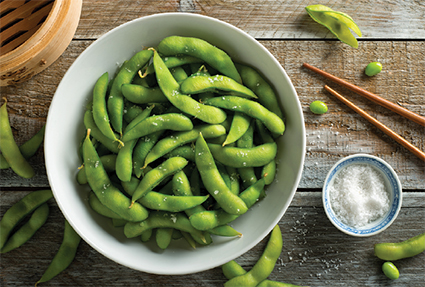
What Nutrients Can Be Lacking in a Vegan Diet?
Although a vegan diet is extremely healthy, it can sometimes be lower in vitamin D, calcium, zinc, and vitamin B12. All it takes is a little planning and preparation to avoid deficiencies of these nutrients. High levels of these nutrients can easily be obtained from a vegan diet with proper planning and a wide variety of foods!
TOP 3 VEGAN MUSCLE-BUILDING TIPS!
Pro Vegan Tip #1: Drink Plant-Based Protein Shakes
One of the easiest ways to ensure your body is getting the right amount of protein and nutrients from a plant-based diet is through protein shakes. If your plant-based meals are lacking in protein, simply have a scoop or two of a good quality vegan protein powder with your meal. Another great option is to make a nutrient-dense plant-based protein shake (that includes protein, carbs, and fats) and have that in between your main meals of the day. This strategy works really well for many people, especially those who need extra calories and don’t have a lot of time to eat throughout the day.
Pro Vegan Tip #2: Prepare Your Protein Sources in Advance
As I already mentioned, planning and preparation are key to a good plant-based diet. But this isn’t anything out of the ordinary for top athletes and physique competitors who already
meticulously plan and prep all their meals in advance. A proper plant-based diet just requires a bit more self-education to ensure you’re getting appropriate levels of protein, amino acids, and all other vital macro- and micronutrients needed by an active body.
Pro Vegan Tip #3: Don’t Be Afraid of Clean Carbs and Fat
Carbs and fats are not the enemy. Quality, unprocessed carbs and healthy essential fats are critical to muscle growth. Make sure your diet contains proper amounts of clean carbs and essential fats, and they will support a positive anabolic environment for muscle growth to occur. About 15 years ago when I first got into bodybuilding, one of the kinesiologists that I used to work with would always remind me that both carbs and fat are protein-sparing nutrients. So don’t be afraid of them, especially if you’re trying to pack on muscle!
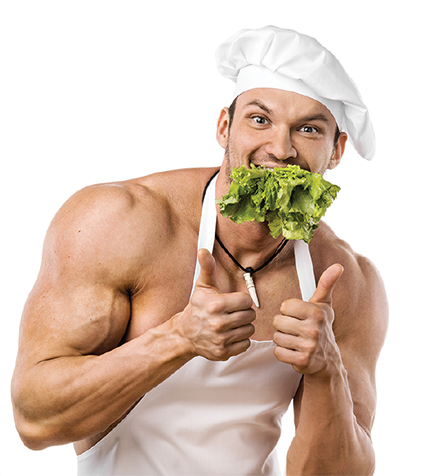
Plant-Based Protein Sources
If you think your plant-based protein choices are more limited to your meat options, boy are you in for a surprise! Here’s just a sampling of some of the many options available to you, along with their protein content.*
PROTEIN CONTENT PER 100 GRAMS
Oats: 16 g
Brown Rice: 3 g
Quinoa: 4 g
Spelt: 14 g
Camelina: 24 g
Chia Seeds: 15 g
Flaxseeds: 19 g
Pumpkin Seeds: 32 g
Hempseeds: 31 g
Sunflower Seeds: 20 g
Sacha Inchi: 28 g
Sesame Seeds: 20 g
Kidney Beans: 5 g
Fava Beans: 26 g
Mung Beans: 23 g
Chickpeas: 8 g
Green Peas: 5 g
Lentils: 9 g
Soybeans: 13 g
Walnuts: 15 g
Hazelnuts: 15 g
Cashews: 18 g
Pistachios: 20 g
Pecans: 9 g
Macadamias: 8 g
Almonds: 22 g
Cocoa: 20 g
Goji Berries: 11 g
Guava: 2 g
Avocado: 2 g
Spinach: 3 g
Broccoli: 4 g
Potato Skins: 6 g
Sun-Dried Tomatoes: 11 g
Dried Mushrooms: 38 g
Tempeh: 20 g
Tofu: 15 g
Tahini: 22 g
Peanut
Butter: 24 g
Spirulina
Seaweed: 57 g
* Protein content percentages have been rounded down to the closest whole number.
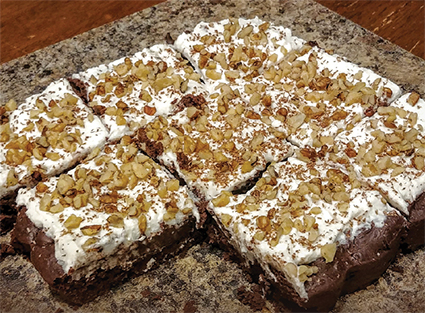
Vegan Protein Brownies
By Bayan Sharafi
Who says vegan has to be boring and bland? Try this tasty gluten-free, protein-packed coconut treat
Ingredients:
1 cup + 2 tbsp soy milk
3/4 cup coconut oil (melted)
1 tbsp vanilla extract
1/2 cup pea or plant-based protein powder
1/2 cup gluten-free flour
1 cup unsweetened cacao powder (use sweetened if desired)
3/8 tsp salt
1/2 tsp baking powder
1/2 cup coconut sugar or brown sugar
2 tbsp flaxseed (or cornstarch)
2/3 cup dark chocolate chips (optional)
Toppings:
3 small cans coconut cream (use just the creamy stuff at the top)
1 tbsp vanilla Jell-O mix
Handful walnuts
Directions:
1. Preheat oven to 350°F.
2. In a bowl, mix together milk, coconut oil, and vanilla extract.
3. In a separate bowl, mix together all dry ingredients thoroughly, then add to wet mix. The batter will be thick, so mix well until fully combined and smooth.
4. Pour into muffin molds or into an 8” × 8” pan. Bake for 15 to 18 minutes.
5. Let cool for 1 to 3 hours. It tastes better once it’s settled and juicy. Store in refrigerator.
Macros:
Makes 9 to 12 servings.
Per serving:
254 calories
8 g protein
24 g carbs
14 g fat

